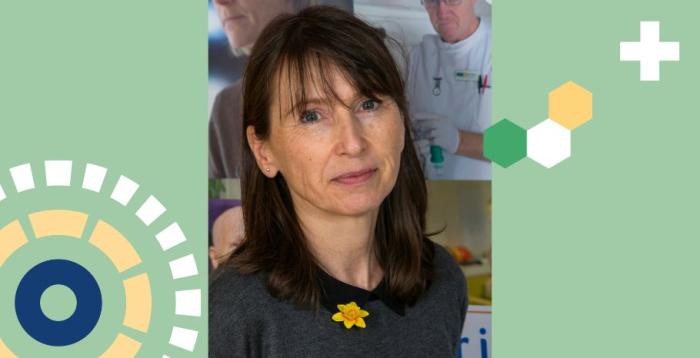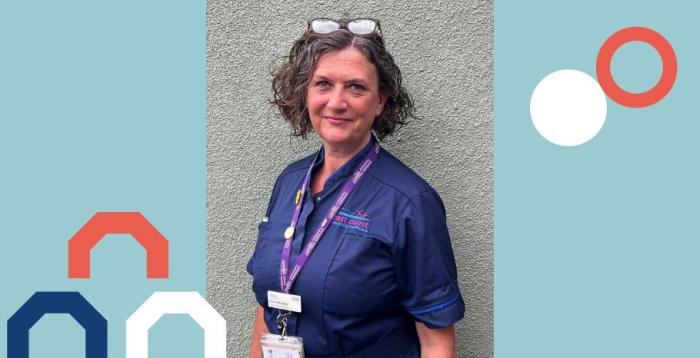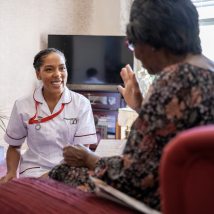For Carers Week, Professor Morag Farquhar, Principal Investigator for the Carer Support Nurse Pilot, shares how this new role is helping carers acknowledge and address their own health-related needs. Carer Support Nurse, Karen Murphy, explains her role and the impact it is having on communities in the east of England.

Professor Morag Farquhar is the Deputy Theme Lead for ARC East of England’s Palliative and End-of-Life Care theme and the Principal Investigator for Carer Support Nurse pilot.
I am Professor of Palliative Care Research at the University of East Anglia. As an early graduate nurse, I was taught to question the evidence behind everything we did, and so caught the research bug! I went on to have a career as a ‘health services researcher with a background in nursing’ gaining grant and fellowship funding including a post-doctoral NIHR Career Development Fellowship.
I am drawn to trying to improve things for patients and the family members and friends who help them. My research focuses on person-centred care for people living with chronic, progressive conditions and the impact on their family/ unpaid carers. I aim to develop and test solutions through my research rather than just identify problems, working with the individuals and communities the research affects.
The Carer Support Nurse role was first conceived nearly 10 years ago when we were given funding by ARC East of England to first explore this idea with carers and patients. I wrote a piece for the Nursing Times discussing a new healthcare role dedicated to supporting carers. The increased awareness and interest in the limited support for unpaid carers in recent years suggested the time was right to explore this again.
Carer Support Nurse Pilot
Unpaid carers can often feel unprepared for their role, and they may lack the confidence and healthcare knowledge needed to provide support to the person they are caring for. Healthcare teams also tend to focus on the patient and do not always recognise carers’ needs, leading to missed signs of anxiety, tiredness, or depression. Carers can also feel reluctant to “trouble” healthcare professionals by talking about their own needs. All of this can be detrimental to the carer’s health and wellbeing, which also impacts their ability to provide care and support. This is why we developed the community-based Carer Support Nurse pilot, to deliver person-centred care to support carers, including those from marginalised communities in Great Yarmouth and Waveney (which is one of the ARC East of England’s Population-in-Focus areas) over the course of a year.
This project is supported by ARC East of England, Health Education England East of England, University of East Anglia Health and Social Care Partners. The Carer Support Nurse role is funded by Norfolk and Waveney Integrated Care Board and hosted by East Coast Community Healthcare.
“I spoke to health and social care professionals, voluntary sectors and carers to see if the idea of a Carer Support Nurse role resonated with them and was blown away by the enthusiasm for this idea from all sectors – not only the concept of this role, but how we would go about evaluating it.”
Professor Morag Farquhar, Principal Investigator
There are three stages to this project, which all involve consulting with carers, and the health, social care and voluntary sectors. In stage one, we explored how the role could work, what resources were already available and explored what the referral criteria should be in order to prioritise those in greatest need. We are currently halfway through the second stage of evaluating the role’s value and impact. This includes collecting information from the Carer Support Nurse, feedback from carers who have been referred, as well as other health, social care and voluntary sector colleagues working alongside the nurse. Finally, in the third stage, we will develop recommendations on how to improve and expand the Carer Support Nurse role into other areas.
The overall aim is to improve or maintain carers’ own health and support them to continue in their caring role, armed with the confidence and skills they need. This could help prevent crises from happening for both the carer and the patient and therefore reduce the impact on healthcare services.
Listening to carers to shape the Carer Support Nurse role
We worked with over 100 carers and patients to develop the Carer Support Nurse role and plan the evaluation. They advised that the role should be community-based and helped us recruit carers to the project, as well as shaping the role. An external Project Advisory Group and a Carer Advisory Group is continuing to advise the project.
“The Carer Support Nurse role is unique as it encourages cross-sector working with other healthcare professionals and third sector organisations. We are already hearing about the positive impact of the role and its very existence has been reported to have an impact on carers – it makes them feel supported.”
Professor Morag Farquhar, Principal Investigator

Karen Murphy is the community-based Carer Support Nurse in this project who is working in Great Yarmouth and Waveney populations in focus.
Since qualifying, I have worked in hospitals and I have been a District Nurse for the past six years. I have always been interested in community nursing as it makes a difference to a person’s life. When I saw the opportunity to become involved with a completely new approach to nursing as a Carer Support Nurse, I could immediately see the benefits it could bring to unpaid carers and the person that they are caring for. Straight away, I thought of the patients and carers I worked with previously who would have benefited from this supportive, holistic, person-centred approach.
Working as a Carer Support Nurse
I think it is important to offer the carers a relaxed and informal setting to chat about their own support needs and the impact of their own health and wellbeing. This is why I tend to see carers in their own homes, especially as they are often unable to leave the person they are caring for.
The greatest barrier is enabling the family member or friend to recognise themselves as a carer, so it is important that the assessment is led by the carer to identify their own support needs. We then create a plan to address these needs, which may involve referring to other services and support groups or continuing support from myself. The outcome of every assessment is different, as no two carers’ support needs are the same. However, the rewards are similar: meeting a carer’s needs often involves and benefits the person they are caring for.
So far, I have supported carers by teaching them how to provide personal care for those they support, techniques for safe moving and handling, and explained how medications work and what they are used for. We discuss what to expect in the future and speak openly about death and the signs of dying. They can share their worries and concerns and access help where it is available. The Carer Support service is unique in that it recognises the carer and their health-related needs.
“I believe the service has a place in the health care system, with the current amount of unpaid carers that are in the community, more needs to be done and I feel very passionate about this.”
Karen Murphy, Carer Support Nurse
The impact of the Carer Support Nurse
Many carers are unprepared and often feel unequipped for a caring role, which impacts their own health. One carer that I have worked with expressed: “My husband and I, we just don’t get on anymore, and I don’t feel like a wife or a person, I just feel like a drudge and a nurse. Because there’s nothing, you know, I mean, there’s just nothing in life. I did say to her [the Carer Support Nurse] I don’t get up in the morning to enjoy life, I get up to endure it.”
A better supported carer who feels listened to will have the confidence to look after themselves and the person they are caring for and have less need to contact other healthcare services. This, in turn, will reduce unplanned hospital admissions and heightened mental health crises.
“I think just having that contact with somebody who is a little bit more in the know of what is out there and what you can get help with, I think it's just nice to have that contact. Because like I said, really right in the beginning, you are literally just out on a limb and having to find all these things out by yourself.”
Anonymous, Study participant
The support given has been very well received by all the carers to date. Some carers have commented on “how it is uplifting to just be listened to” and others have benefited from being able to openly speak to someone. One carer reflected: “So I would say [seeing the Carer Support Nurse was] very helpful, because at the end of the day if you find yourself in a situation where then you think -Well, I do need some help - it's knowing that there's someone there. Even if she [the Carer Support Nurse] can't help herself, she can probably get the help for you from somewhere else, sort of thing. It is always good to have a contact point and someone that you can turn to, and sometimes also outside the family. You can say things to someone who's not emotionally attached, shall we say, that you can't say to your family because you hold back a lot of stuff from your family, because you don't want to upset them.”
Although the project is ongoing, I hope that the Carer Support Nurse Service continues and is available to support carers throughout their caring journey and beyond.
Next steps
Currently, the Carer Support Nurse offers short-term support to carers, but the skills and confidence that they are learning from Karen will support them in their caring responsibilities going forward. Carers have expressed that they would like to have long term support, which we will review during stage three, where we will develop recommendations on the future of the service. We will be sharing our findings and recommendations regionally and nationally through a webinar, brief reports and publish papers in academic and professional journals.
Carer Support Nurse pilot was nominated, and has won the regional award for the NHS Parliamentary Award in the Nursing and Midwifery category. The Carer Support Nurse has been shortlisted as a finalist for the national RCNi award in the 'Innovations' category.
If you would like to learn more about the project, then please contact Morag Farquhar M.Farquhar@uea.ac.uk.
For more information about the referral process, please see information on the East Coast Community Healthcare and the leaflet. Alternatively, please call 01493 809977 and request a referral to the Carer Support Nurse.
For more information, please see UEA Health & Social Care Partners.
Find out more about ARC EoE Palliative and End-of-Life Care research here.
For queries concerning this article, email ARC East of England Core Team: ARCOffice@cpft.nhs.uk.
